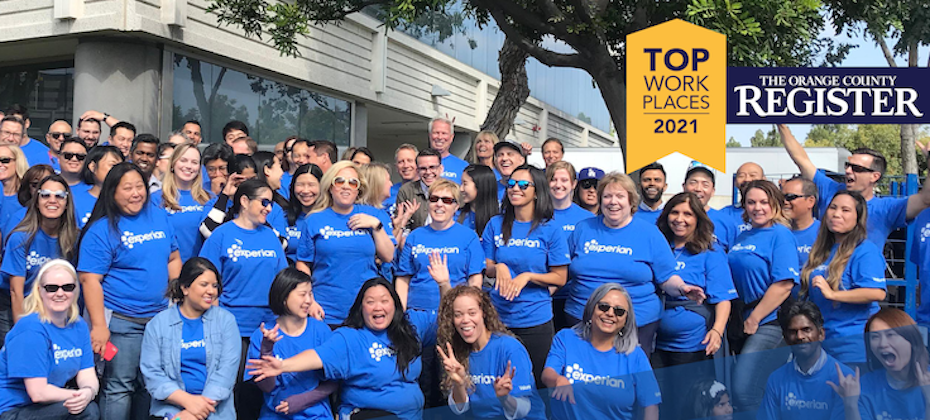
For the ninth year, the Orange County Register has named Experian North America as a Top Workplace, securing the #1 ranking for the second consecutive year. The award, which is based on employee feedback in a survey of hundreds of leading companies in Orange County, recognizes our company’s culture of inclusion, and our commitment to employees and communities. Orange County is the home of our North America operations, and we are especially honored to be recognized again for our inclusive work environment and achieving higher performance while giving back. This honor demonstrates the talent and compassion of all the people who work at Experian. Thank You All our decisions are driven by our desire to ensure our employees feel valued and protected. As part of this, we issued a ‘Thank You’ Share Award to all employees at the beginning of this year to recognize perseverance through the pandemic, giving thousands of employees an equity stake in the company. Coming Together Our Employee Resource Groups (ERGs) continue to grow and support employees in different ways, which include activities that bring employees together internally to serve their communities externally. For example, our Asian American ERG worked closely with Pan-Asian leadership organization Ascend to support the Asian American community and employees, considering increasing discrimination and xenophobia during the pandemic. Together they kicked off Feed Your Hospital, which facilitated the delivery of meals to frontline COVID-19 healthcare workers by supporting local Asian restaurants. Meals were purchased at the restaurants and delivered to participating hospitals. The campaign raised funds for hospitals in Orange County. Social Good This year, we also awarded two OC-based organizations with major grants – the OC Hispanic Chamber of Commerce and TGR Foundation (a Tiger Woods Charity). For the OC Hispanic Chamber of Commerce, we funded and facilitated credit education initiatives for the Youth Chamber Program – funds went towards scholarship awards and event costs. We also added credit education to the ‘Pre-Venture Business Program’ curriculum – with funds going into marketing, training, one-on-one consulting, and event costs offered in both Spanish and English. For the TGR Foundation grant, we are working on ongoing projects with the foundation to support credit education, small business entrepreneurship, homeownership, and financial inclusion efforts. In total, employees volunteered more than 900 hours to Orange County-based nonprofits and Experian matched funds to those organizations that employees volunteered with and donated to. Our employees continue to help people who are facing unprecedented and unforeseen challenges. Different groups and employees of all levels are working together to help our clients, customers and communities persevere. We are honored that the Orange County Register continues to recognize our tireless efforts to make a difference in the communities in which we live and work.

Over the past year at Experian, we’ve continued to facilitate innovation in the fintech space – leveraging our expertise and history of helping financial institutions and individuals address a wide range of challenges. We’re thrilled to be recognized for the impact of this important work, being named a global fintech leader in the Center for Financial Professionals (CeFPro) Fintech Leaders 2022 report. One of the most comprehensive international research and ranking programs on the status of fintech in financial services, CeFPro ranks Experian among the report’s top companies within the Fraud Prevention and Credit Risk categories, and in the top 15 Overall Ecosystem Rankings. This recognition showcases the value of fraud and identity management services amid the rise of digital channels, and critical importance of continuing to develop strategies to mitigate risk. At Experian we have a deep history in pioneering tools and services that prioritize improving financial health for all. Through the ongoing development of our core products and continued innovations, we believe improving financial health is how we can make a difference for institutions and individuals alike. Our core products harness the expertise of our people and are examples to others in the industry who look to advance innovation in the fintech space and beyond. We continue to invest in new technology and infrastructure to deliver fresh insights and transform the way businesses and consumers operate. For more than 125 years, we’ve helped consumers and clients prosper. Recognition by the CeFPro report is particularly meaningful to us. The study garners their rankings from the very individuals and institutions that engage with Experian – drawing on market analysis and original research that is also backed by an advisory board composed of 60 international industry professionals. We’re honored and inspired – and look forward to continuing to push the envelope in the fintech space and beyond.

The United Nations identifies removing poverty as one of its 17 Sustainable Development Goals. There’s a reason it’s number one on their list: Access to affordable financial services opens the door to opportunities for people to transform their lives – from homes and healthcare to education and entrepreneurship.. At Experian, our focus is on increasing access to financial services, improving financial literacy and building consumer confidence; we help people take control of their financial health. We are using the power of data innovation to transform lives and help businesses grow, improving financial health for people around the world. We created a dedicated Social Innovation Programme to fund, build and recognize products that will have a positive impact on the financial health of consumers. Between 2013 and April 2021 we have invested over US$8m across 29 product ideas. Eighteen of those products have launched, reaching 61 million people, many of whom are from financially vulnerable backgrounds. In June, we opened applications for our latest round of annual Social Innovation funding and asked teams to come up with new innovative products that positively impact the financial health of our consumers and use data for good. Of these, seven projects were shortlisted and presented to our Social Innovation Committee, which I am privileged enough to chair. It was a tough decision, but we chose three truly diverse projects to receive this year’s Social Innovation funding and we are really excited about what they could achieve. These projects will give millions of people in India access to a more positive loan decision, allow citizens in the UK to manage their vulnerability data across multiple organisations, and help farmers in Brazil to access the credit they need to keep their businesses going. Between them, these three projects alone have the potential to reach over 85 million people in the next five years, which is a truly exciting prospect. We are proud to celebrate our culture of purpose-led innovation. Our social innovation products have reached 61 million people since 2013 and we aim to reach 100 million by 2025. Read more about how we are helping to create a better tomorrow.


